Case Study: Police Ethics, Discretion, and Communication Skills
VerifiedAdded on 2023/04/23
|8
|2079
|368
Essay
AI Summary
This essay critically examines a scenario involving police officers and a homeless man, focusing on ethical conduct, discretionary judgment, and communication skills. The analysis reveals failures in adhering to professional standards and ethical guidelines expected of law enforcement. Specifically, the senior constable's actions, including the arrest of the old man for offensive language and potential assault, are scrutinized against the NSW Police Force's Code of Ethics and relevant legislation. The essay discusses the inappropriate use of police discretion, highlighting how the officers could have better managed the situation by providing assistance to the man instead of resorting to arrest. Furthermore, the importance of effective communication skills, such as active listening and non-verbal cues, is emphasized as a means to de-escalate conflicts and build trust within the community. The conclusion underscores the necessity for police officers to uphold ethical standards, exercise discretion responsibly, and communicate effectively to foster positive relationships and ensure public safety. Desklib offers a platform for students to access similar solved assignments and past papers.

Paraphrase This Document
Need a fresh take? Get an instant paraphrase of this document with our AI Paraphraser
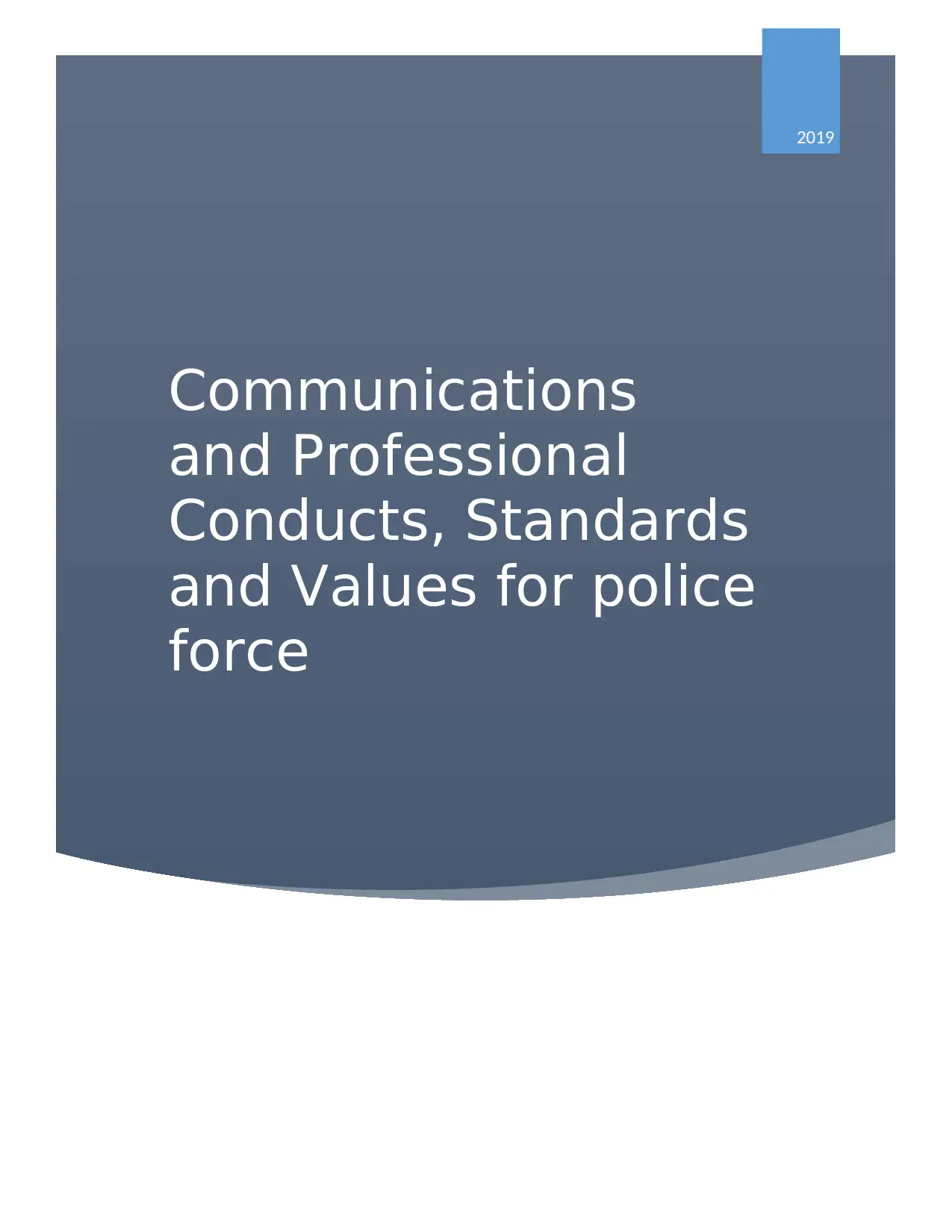
Communications
and Professional
Conducts, Standards
and Values for police
force
2019
and Professional
Conducts, Standards
and Values for police
force
2019
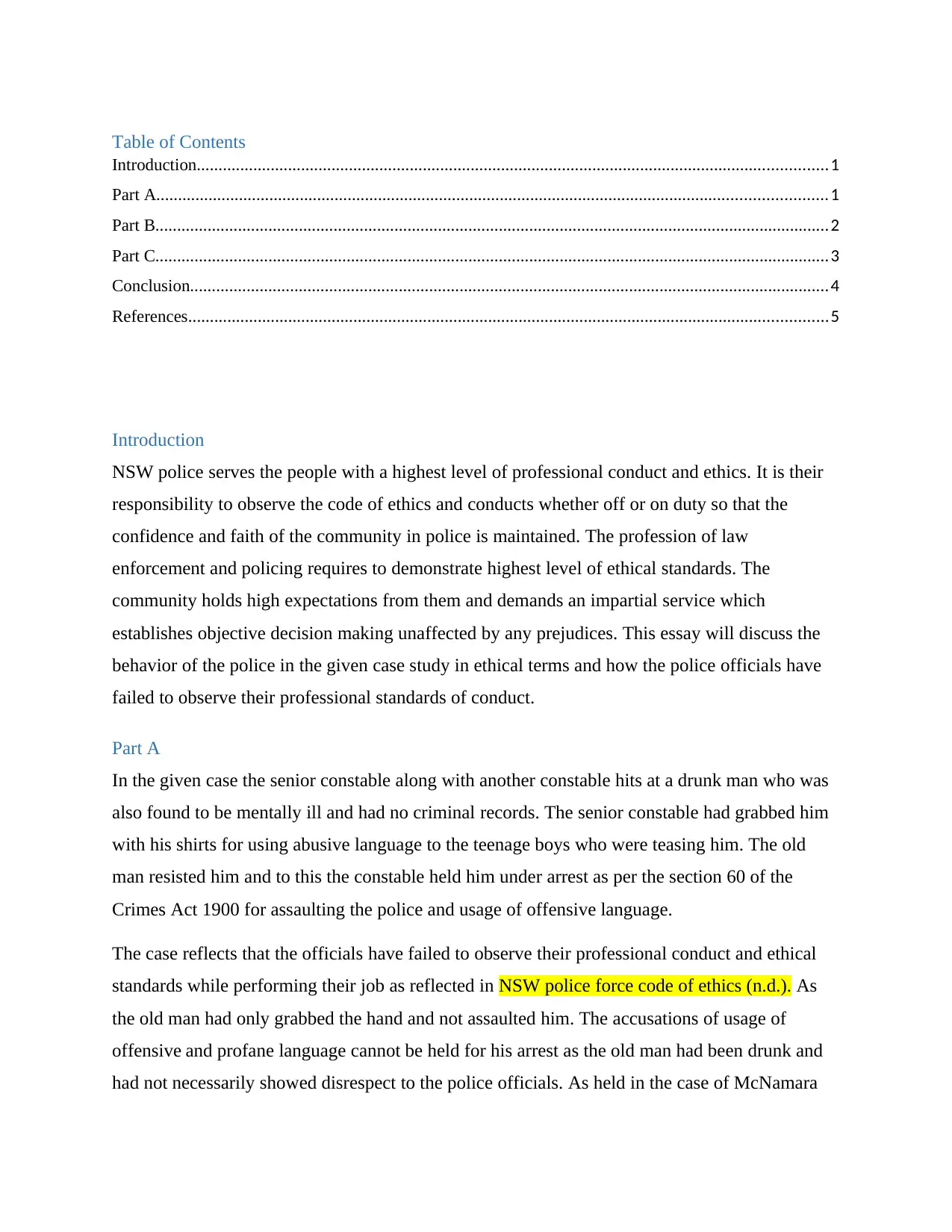
Table of Contents
Introduction.................................................................................................................................................1
Part A..........................................................................................................................................................1
Part B...........................................................................................................................................................2
Part C...........................................................................................................................................................3
Conclusion...................................................................................................................................................4
References...................................................................................................................................................5
Introduction
NSW police serves the people with a highest level of professional conduct and ethics. It is their
responsibility to observe the code of ethics and conducts whether off or on duty so that the
confidence and faith of the community in police is maintained. The profession of law
enforcement and policing requires to demonstrate highest level of ethical standards. The
community holds high expectations from them and demands an impartial service which
establishes objective decision making unaffected by any prejudices. This essay will discuss the
behavior of the police in the given case study in ethical terms and how the police officials have
failed to observe their professional standards of conduct.
Part A
In the given case the senior constable along with another constable hits at a drunk man who was
also found to be mentally ill and had no criminal records. The senior constable had grabbed him
with his shirts for using abusive language to the teenage boys who were teasing him. The old
man resisted him and to this the constable held him under arrest as per the section 60 of the
Crimes Act 1900 for assaulting the police and usage of offensive language.
The case reflects that the officials have failed to observe their professional conduct and ethical
standards while performing their job as reflected in NSW police force code of ethics (n.d.). As
the old man had only grabbed the hand and not assaulted him. The accusations of usage of
offensive and profane language cannot be held for his arrest as the old man had been drunk and
had not necessarily showed disrespect to the police officials. As held in the case of McNamara
Introduction.................................................................................................................................................1
Part A..........................................................................................................................................................1
Part B...........................................................................................................................................................2
Part C...........................................................................................................................................................3
Conclusion...................................................................................................................................................4
References...................................................................................................................................................5
Introduction
NSW police serves the people with a highest level of professional conduct and ethics. It is their
responsibility to observe the code of ethics and conducts whether off or on duty so that the
confidence and faith of the community in police is maintained. The profession of law
enforcement and policing requires to demonstrate highest level of ethical standards. The
community holds high expectations from them and demands an impartial service which
establishes objective decision making unaffected by any prejudices. This essay will discuss the
behavior of the police in the given case study in ethical terms and how the police officials have
failed to observe their professional standards of conduct.
Part A
In the given case the senior constable along with another constable hits at a drunk man who was
also found to be mentally ill and had no criminal records. The senior constable had grabbed him
with his shirts for using abusive language to the teenage boys who were teasing him. The old
man resisted him and to this the constable held him under arrest as per the section 60 of the
Crimes Act 1900 for assaulting the police and usage of offensive language.
The case reflects that the officials have failed to observe their professional conduct and ethical
standards while performing their job as reflected in NSW police force code of ethics (n.d.). As
the old man had only grabbed the hand and not assaulted him. The accusations of usage of
offensive and profane language cannot be held for his arrest as the old man had been drunk and
had not necessarily showed disrespect to the police officials. As held in the case of McNamara
⊘ This is a preview!⊘
Do you want full access?
Subscribe today to unlock all pages.

Trusted by 1+ million students worldwide
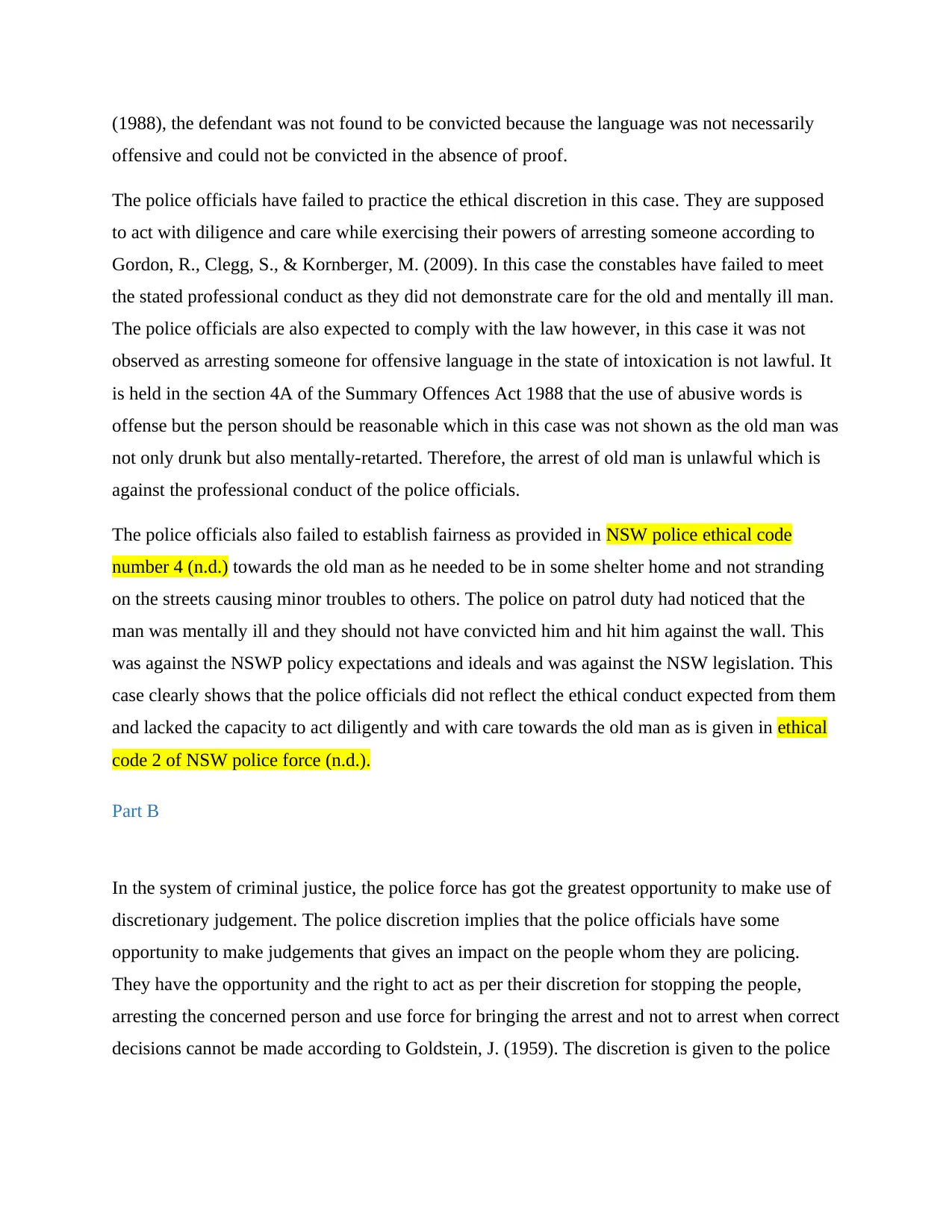
(1988), the defendant was not found to be convicted because the language was not necessarily
offensive and could not be convicted in the absence of proof.
The police officials have failed to practice the ethical discretion in this case. They are supposed
to act with diligence and care while exercising their powers of arresting someone according to
Gordon, R., Clegg, S., & Kornberger, M. (2009). In this case the constables have failed to meet
the stated professional conduct as they did not demonstrate care for the old and mentally ill man.
The police officials are also expected to comply with the law however, in this case it was not
observed as arresting someone for offensive language in the state of intoxication is not lawful. It
is held in the section 4A of the Summary Offences Act 1988 that the use of abusive words is
offense but the person should be reasonable which in this case was not shown as the old man was
not only drunk but also mentally-retarted. Therefore, the arrest of old man is unlawful which is
against the professional conduct of the police officials.
The police officials also failed to establish fairness as provided in NSW police ethical code
number 4 (n.d.) towards the old man as he needed to be in some shelter home and not stranding
on the streets causing minor troubles to others. The police on patrol duty had noticed that the
man was mentally ill and they should not have convicted him and hit him against the wall. This
was against the NSWP policy expectations and ideals and was against the NSW legislation. This
case clearly shows that the police officials did not reflect the ethical conduct expected from them
and lacked the capacity to act diligently and with care towards the old man as is given in ethical
code 2 of NSW police force (n.d.).
Part B
In the system of criminal justice, the police force has got the greatest opportunity to make use of
discretionary judgement. The police discretion implies that the police officials have some
opportunity to make judgements that gives an impact on the people whom they are policing.
They have the opportunity and the right to act as per their discretion for stopping the people,
arresting the concerned person and use force for bringing the arrest and not to arrest when correct
decisions cannot be made according to Goldstein, J. (1959). The discretion is given to the police
offensive and could not be convicted in the absence of proof.
The police officials have failed to practice the ethical discretion in this case. They are supposed
to act with diligence and care while exercising their powers of arresting someone according to
Gordon, R., Clegg, S., & Kornberger, M. (2009). In this case the constables have failed to meet
the stated professional conduct as they did not demonstrate care for the old and mentally ill man.
The police officials are also expected to comply with the law however, in this case it was not
observed as arresting someone for offensive language in the state of intoxication is not lawful. It
is held in the section 4A of the Summary Offences Act 1988 that the use of abusive words is
offense but the person should be reasonable which in this case was not shown as the old man was
not only drunk but also mentally-retarted. Therefore, the arrest of old man is unlawful which is
against the professional conduct of the police officials.
The police officials also failed to establish fairness as provided in NSW police ethical code
number 4 (n.d.) towards the old man as he needed to be in some shelter home and not stranding
on the streets causing minor troubles to others. The police on patrol duty had noticed that the
man was mentally ill and they should not have convicted him and hit him against the wall. This
was against the NSWP policy expectations and ideals and was against the NSW legislation. This
case clearly shows that the police officials did not reflect the ethical conduct expected from them
and lacked the capacity to act diligently and with care towards the old man as is given in ethical
code 2 of NSW police force (n.d.).
Part B
In the system of criminal justice, the police force has got the greatest opportunity to make use of
discretionary judgement. The police discretion implies that the police officials have some
opportunity to make judgements that gives an impact on the people whom they are policing.
They have the opportunity and the right to act as per their discretion for stopping the people,
arresting the concerned person and use force for bringing the arrest and not to arrest when correct
decisions cannot be made according to Goldstein, J. (1959). The discretion is given to the police
Paraphrase This Document
Need a fresh take? Get an instant paraphrase of this document with our AI Paraphraser
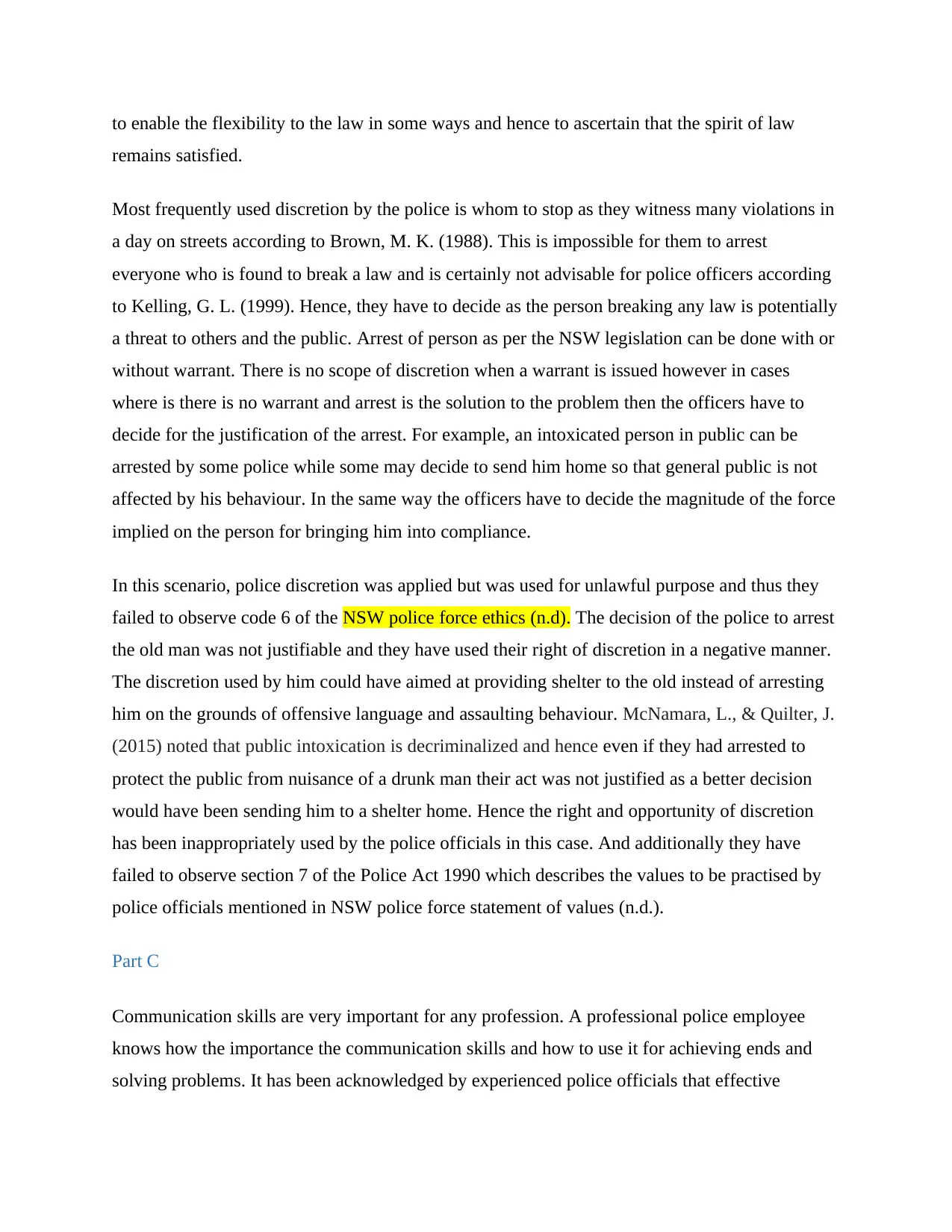
to enable the flexibility to the law in some ways and hence to ascertain that the spirit of law
remains satisfied.
Most frequently used discretion by the police is whom to stop as they witness many violations in
a day on streets according to Brown, M. K. (1988). This is impossible for them to arrest
everyone who is found to break a law and is certainly not advisable for police officers according
to Kelling, G. L. (1999). Hence, they have to decide as the person breaking any law is potentially
a threat to others and the public. Arrest of person as per the NSW legislation can be done with or
without warrant. There is no scope of discretion when a warrant is issued however in cases
where is there is no warrant and arrest is the solution to the problem then the officers have to
decide for the justification of the arrest. For example, an intoxicated person in public can be
arrested by some police while some may decide to send him home so that general public is not
affected by his behaviour. In the same way the officers have to decide the magnitude of the force
implied on the person for bringing him into compliance.
In this scenario, police discretion was applied but was used for unlawful purpose and thus they
failed to observe code 6 of the NSW police force ethics (n.d). The decision of the police to arrest
the old man was not justifiable and they have used their right of discretion in a negative manner.
The discretion used by him could have aimed at providing shelter to the old instead of arresting
him on the grounds of offensive language and assaulting behaviour. McNamara, L., & Quilter, J.
(2015) noted that public intoxication is decriminalized and hence even if they had arrested to
protect the public from nuisance of a drunk man their act was not justified as a better decision
would have been sending him to a shelter home. Hence the right and opportunity of discretion
has been inappropriately used by the police officials in this case. And additionally they have
failed to observe section 7 of the Police Act 1990 which describes the values to be practised by
police officials mentioned in NSW police force statement of values (n.d.).
Part C
Communication skills are very important for any profession. A professional police employee
knows how the importance the communication skills and how to use it for achieving ends and
solving problems. It has been acknowledged by experienced police officials that effective
remains satisfied.
Most frequently used discretion by the police is whom to stop as they witness many violations in
a day on streets according to Brown, M. K. (1988). This is impossible for them to arrest
everyone who is found to break a law and is certainly not advisable for police officers according
to Kelling, G. L. (1999). Hence, they have to decide as the person breaking any law is potentially
a threat to others and the public. Arrest of person as per the NSW legislation can be done with or
without warrant. There is no scope of discretion when a warrant is issued however in cases
where is there is no warrant and arrest is the solution to the problem then the officers have to
decide for the justification of the arrest. For example, an intoxicated person in public can be
arrested by some police while some may decide to send him home so that general public is not
affected by his behaviour. In the same way the officers have to decide the magnitude of the force
implied on the person for bringing him into compliance.
In this scenario, police discretion was applied but was used for unlawful purpose and thus they
failed to observe code 6 of the NSW police force ethics (n.d). The decision of the police to arrest
the old man was not justifiable and they have used their right of discretion in a negative manner.
The discretion used by him could have aimed at providing shelter to the old instead of arresting
him on the grounds of offensive language and assaulting behaviour. McNamara, L., & Quilter, J.
(2015) noted that public intoxication is decriminalized and hence even if they had arrested to
protect the public from nuisance of a drunk man their act was not justified as a better decision
would have been sending him to a shelter home. Hence the right and opportunity of discretion
has been inappropriately used by the police officials in this case. And additionally they have
failed to observe section 7 of the Police Act 1990 which describes the values to be practised by
police officials mentioned in NSW police force statement of values (n.d.).
Part C
Communication skills are very important for any profession. A professional police employee
knows how the importance the communication skills and how to use it for achieving ends and
solving problems. It has been acknowledged by experienced police officials that effective
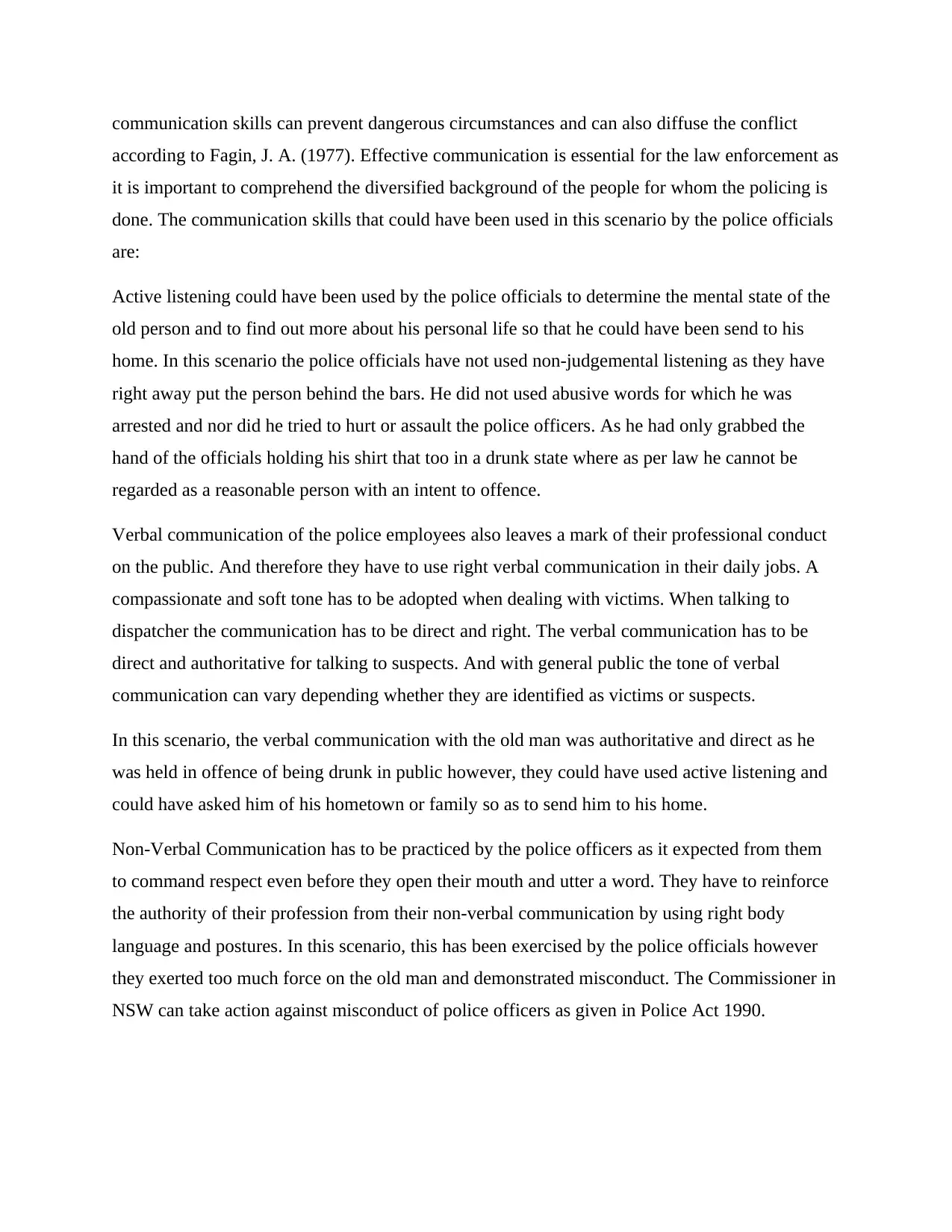
communication skills can prevent dangerous circumstances and can also diffuse the conflict
according to Fagin, J. A. (1977). Effective communication is essential for the law enforcement as
it is important to comprehend the diversified background of the people for whom the policing is
done. The communication skills that could have been used in this scenario by the police officials
are:
Active listening could have been used by the police officials to determine the mental state of the
old person and to find out more about his personal life so that he could have been send to his
home. In this scenario the police officials have not used non-judgemental listening as they have
right away put the person behind the bars. He did not used abusive words for which he was
arrested and nor did he tried to hurt or assault the police officers. As he had only grabbed the
hand of the officials holding his shirt that too in a drunk state where as per law he cannot be
regarded as a reasonable person with an intent to offence.
Verbal communication of the police employees also leaves a mark of their professional conduct
on the public. And therefore they have to use right verbal communication in their daily jobs. A
compassionate and soft tone has to be adopted when dealing with victims. When talking to
dispatcher the communication has to be direct and right. The verbal communication has to be
direct and authoritative for talking to suspects. And with general public the tone of verbal
communication can vary depending whether they are identified as victims or suspects.
In this scenario, the verbal communication with the old man was authoritative and direct as he
was held in offence of being drunk in public however, they could have used active listening and
could have asked him of his hometown or family so as to send him to his home.
Non-Verbal Communication has to be practiced by the police officers as it expected from them
to command respect even before they open their mouth and utter a word. They have to reinforce
the authority of their profession from their non-verbal communication by using right body
language and postures. In this scenario, this has been exercised by the police officials however
they exerted too much force on the old man and demonstrated misconduct. The Commissioner in
NSW can take action against misconduct of police officers as given in Police Act 1990.
according to Fagin, J. A. (1977). Effective communication is essential for the law enforcement as
it is important to comprehend the diversified background of the people for whom the policing is
done. The communication skills that could have been used in this scenario by the police officials
are:
Active listening could have been used by the police officials to determine the mental state of the
old person and to find out more about his personal life so that he could have been send to his
home. In this scenario the police officials have not used non-judgemental listening as they have
right away put the person behind the bars. He did not used abusive words for which he was
arrested and nor did he tried to hurt or assault the police officers. As he had only grabbed the
hand of the officials holding his shirt that too in a drunk state where as per law he cannot be
regarded as a reasonable person with an intent to offence.
Verbal communication of the police employees also leaves a mark of their professional conduct
on the public. And therefore they have to use right verbal communication in their daily jobs. A
compassionate and soft tone has to be adopted when dealing with victims. When talking to
dispatcher the communication has to be direct and right. The verbal communication has to be
direct and authoritative for talking to suspects. And with general public the tone of verbal
communication can vary depending whether they are identified as victims or suspects.
In this scenario, the verbal communication with the old man was authoritative and direct as he
was held in offence of being drunk in public however, they could have used active listening and
could have asked him of his hometown or family so as to send him to his home.
Non-Verbal Communication has to be practiced by the police officers as it expected from them
to command respect even before they open their mouth and utter a word. They have to reinforce
the authority of their profession from their non-verbal communication by using right body
language and postures. In this scenario, this has been exercised by the police officials however
they exerted too much force on the old man and demonstrated misconduct. The Commissioner in
NSW can take action against misconduct of police officers as given in Police Act 1990.
⊘ This is a preview!⊘
Do you want full access?
Subscribe today to unlock all pages.

Trusted by 1+ million students worldwide
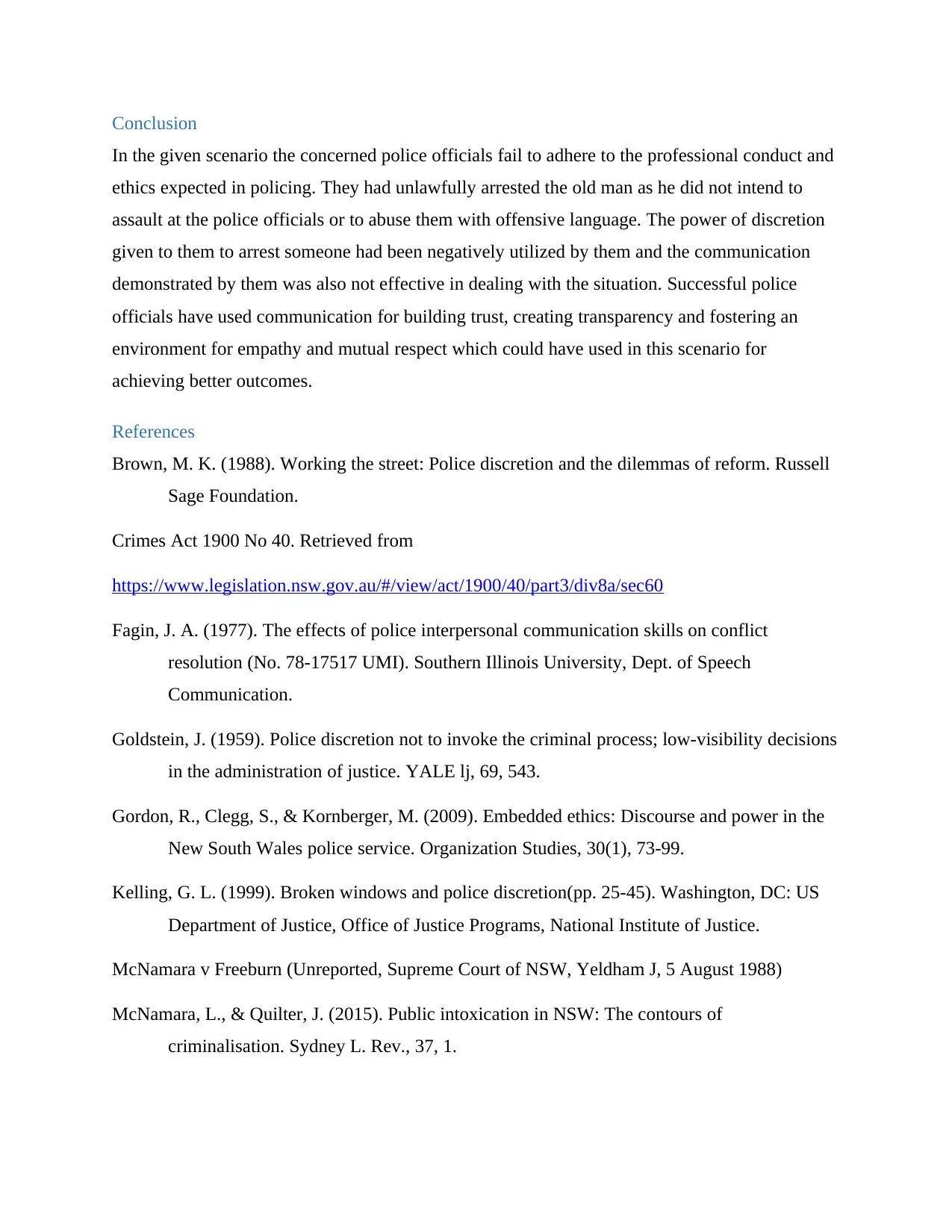
Conclusion
In the given scenario the concerned police officials fail to adhere to the professional conduct and
ethics expected in policing. They had unlawfully arrested the old man as he did not intend to
assault at the police officials or to abuse them with offensive language. The power of discretion
given to them to arrest someone had been negatively utilized by them and the communication
demonstrated by them was also not effective in dealing with the situation. Successful police
officials have used communication for building trust, creating transparency and fostering an
environment for empathy and mutual respect which could have used in this scenario for
achieving better outcomes.
References
Brown, M. K. (1988). Working the street: Police discretion and the dilemmas of reform. Russell
Sage Foundation.
Crimes Act 1900 No 40. Retrieved from
https://www.legislation.nsw.gov.au/#/view/act/1900/40/part3/div8a/sec60
Fagin, J. A. (1977). The effects of police interpersonal communication skills on conflict
resolution (No. 78-17517 UMI). Southern Illinois University, Dept. of Speech
Communication.
Goldstein, J. (1959). Police discretion not to invoke the criminal process; low-visibility decisions
in the administration of justice. YALE lj, 69, 543.
Gordon, R., Clegg, S., & Kornberger, M. (2009). Embedded ethics: Discourse and power in the
New South Wales police service. Organization Studies, 30(1), 73-99.
Kelling, G. L. (1999). Broken windows and police discretion(pp. 25-45). Washington, DC: US
Department of Justice, Office of Justice Programs, National Institute of Justice.
McNamara v Freeburn (Unreported, Supreme Court of NSW, Yeldham J, 5 August 1988)
McNamara, L., & Quilter, J. (2015). Public intoxication in NSW: The contours of
criminalisation. Sydney L. Rev., 37, 1.
In the given scenario the concerned police officials fail to adhere to the professional conduct and
ethics expected in policing. They had unlawfully arrested the old man as he did not intend to
assault at the police officials or to abuse them with offensive language. The power of discretion
given to them to arrest someone had been negatively utilized by them and the communication
demonstrated by them was also not effective in dealing with the situation. Successful police
officials have used communication for building trust, creating transparency and fostering an
environment for empathy and mutual respect which could have used in this scenario for
achieving better outcomes.
References
Brown, M. K. (1988). Working the street: Police discretion and the dilemmas of reform. Russell
Sage Foundation.
Crimes Act 1900 No 40. Retrieved from
https://www.legislation.nsw.gov.au/#/view/act/1900/40/part3/div8a/sec60
Fagin, J. A. (1977). The effects of police interpersonal communication skills on conflict
resolution (No. 78-17517 UMI). Southern Illinois University, Dept. of Speech
Communication.
Goldstein, J. (1959). Police discretion not to invoke the criminal process; low-visibility decisions
in the administration of justice. YALE lj, 69, 543.
Gordon, R., Clegg, S., & Kornberger, M. (2009). Embedded ethics: Discourse and power in the
New South Wales police service. Organization Studies, 30(1), 73-99.
Kelling, G. L. (1999). Broken windows and police discretion(pp. 25-45). Washington, DC: US
Department of Justice, Office of Justice Programs, National Institute of Justice.
McNamara v Freeburn (Unreported, Supreme Court of NSW, Yeldham J, 5 August 1988)
McNamara, L., & Quilter, J. (2015). Public intoxication in NSW: The contours of
criminalisation. Sydney L. Rev., 37, 1.
Paraphrase This Document
Need a fresh take? Get an instant paraphrase of this document with our AI Paraphraser

NSW Police Force. (n.d.). Code of Conduct and Ethics. Retrieved from
https://www.police.nsw.gov.au/__data/assets/pdf_file/0004/508315/COCE_113782_01_
Dec_14.pdf
NSW Police Force. (n.d.). Statement of Values. Retrieved from
https://www.police.nsw.gov.au/__data/assets/pdf_file/0005/508316/
Statement_of_Values_579004_01_Dec_14.pdf
Police Act 1990 No 47. Retrieved from
https://www.legislation.nsw.gov.au/#/view/act/1990/47/part9
Summary Offences Act 1988 No 25. Retrieved from
https://www.legislation.nsw.gov.au/#/view/act/1988/25/part2/div1/sec4a
https://www.police.nsw.gov.au/__data/assets/pdf_file/0004/508315/COCE_113782_01_
Dec_14.pdf
NSW Police Force. (n.d.). Statement of Values. Retrieved from
https://www.police.nsw.gov.au/__data/assets/pdf_file/0005/508316/
Statement_of_Values_579004_01_Dec_14.pdf
Police Act 1990 No 47. Retrieved from
https://www.legislation.nsw.gov.au/#/view/act/1990/47/part9
Summary Offences Act 1988 No 25. Retrieved from
https://www.legislation.nsw.gov.au/#/view/act/1988/25/part2/div1/sec4a
1 out of 8
Your All-in-One AI-Powered Toolkit for Academic Success.
+13062052269
info@desklib.com
Available 24*7 on WhatsApp / Email
![[object Object]](/_next/static/media/star-bottom.7253800d.svg)
Unlock your academic potential
Copyright © 2020–2026 A2Z Services. All Rights Reserved. Developed and managed by ZUCOL.